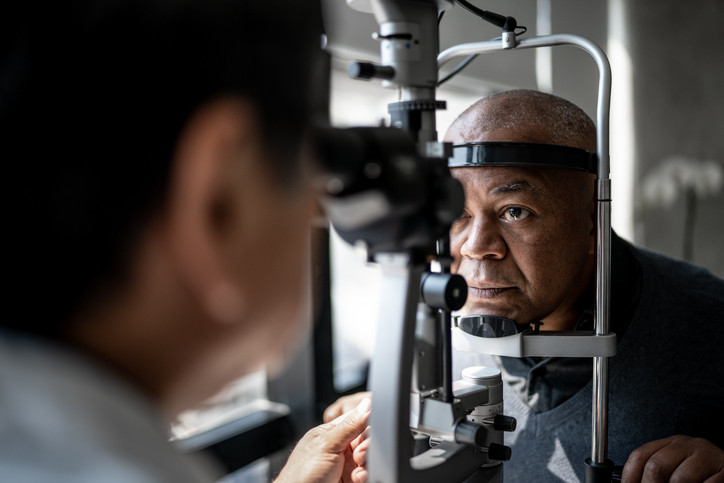Could cataract surgery protect against dementia?

Over the last several decades, cataract surgery has become exceptionally safe and rather routine in this country. Annually, an estimated two million Americans have this procedure, mostly older adults. The numbers could double or even triple by 2050.
Yet while many of us think cataract surgery merely sharpens vision, research suggests it may keep minds sharper, too, and help prevent dementia.
Research shows a link between vision loss and dementia
Recent research has noted a link between age-related macular degeneration, cataracts, or diabetes-related eye disease and dementia. One study found an increased risk of dementia in older adults who experienced worsening vision over an eight-year period.
So might preventing or reversing vision loss reduce the risk of dementia? Previous studies have been mixed. According to a 2015 study, cataract surgery was linked with a reduced risk of future dementia. A 2018 study found no beneficial effect on dementia risk, but a lower risk of mild cognitive impairment. Differences in study populations and methods, including the definition of dementia, may explain the different findings.
New evidence that cataract surgery may prevent dementia
A new study in JAMA Internal Medicine makes a strong case that removing cataracts may reduce your risk for developing dementia. It analyzes the relationship between cataract surgery and risk of dementia over time among more than 3,000 older adults with cataracts or glaucoma. None had dementia at the start of the study.
The researchers found:
- The risk of developing dementia was 29% lower among people who had cataract surgery than among otherwise similar people who did not have this surgery.
- Among people with glaucoma, the risk of dementia was the same whether they did or didn't have surgery. (Of note, glaucoma surgery does not restore vision.)
- Study results were unlikely to be due to differences in health or access to healthcare, or other risk factors for dementia. After researchers accounted for these factors, the results were unchanged.
While compelling, these findings need to be confirmed by others, as the researchers note. And future studies should include a more diverse population: more than 90% of study participants were white, and all had ready access to comprehensive health care, including cataract surgery.
Why would cataract surgery protect brain health?
The connection certainly didn't seem obvious to me. In fact, this latest study doesn't assess why cataract surgery might reduce the risk of dementia. Previous theories include:
- Reduced sensory input to the brain is detrimental to function. This is sometimes called the sensory deprivation hypothesis (or the "use it or lose it" hypothesis): less sensory input of any kind leads to less brain stimulation and, as a result, loss of brain function. Supporting this idea, at least one study has demonstrated improved brain function and appearance on MRI scans after cataract surgery.
- Not being able to see well due to cataracts may lead people to restrict mental and physical activity. Studies have demonstrated that limited physical activity and social engagement increase the risk of dementia.
- Cataract-related vision loss, along with, perhaps, other age-related challenges, may contribute to depression, which may increase the risk of dementia.
It could be a combination of these or other factors. The truth is, we don't know yet why cataract surgery may reduce dementia risk.
Other benefits of cataract surgery
Imagine restoring blurred or distorted vision, which many people with cataracts find especially troublesome at night. Even better, cataract surgery can preserve vision before significant loss occurs. Restored vision permits many activities, enhances qualify of life, and supports independence.
Cataract surgery may also improve symptoms of depression and even prolong lifespan. Other studies have suggested it may reduce the risk of falls, a benefit with profound implications for older adults. A fall may cause hip or spine fractures, steal independence, or even hasten death.
Cataract surgery is not available everywhere
Despite how common cataract surgery is, it's worth noting that this operation is not equally available in all countries. In resource-poor nations, millions of people with preventable vision loss go untreated. If it's true that cataract surgery can not only improve vision, but also reduce the risk of dementia and provide other health benefits, it's even more important that this surgery be equitably accessible.
The bottom line
If you have trouble with your vision due to cataracts or some other cause, talk to an eye doctor about treatment options. Like any operation, cataract surgery has risks and benefits to consider. But remarkably, as the risks of cataract surgery have decreased over time, the list of its benefits appears to be getting longer.
Follow me on Twitter @RobShmerling
About the Author

Robert H. Shmerling, MD, Senior Faculty Editor, Harvard Health Publishing; Editorial Advisory Board Member, Harvard Health Publishing
Disclaimer:
As a service to our readers, Harvard Health Publishing provides access to our library of archived content. Please note the date of last review or update on all articles.
No content on this site, regardless of date, should ever be used as a substitute for direct medical advice from your doctor or other qualified clinician.
















